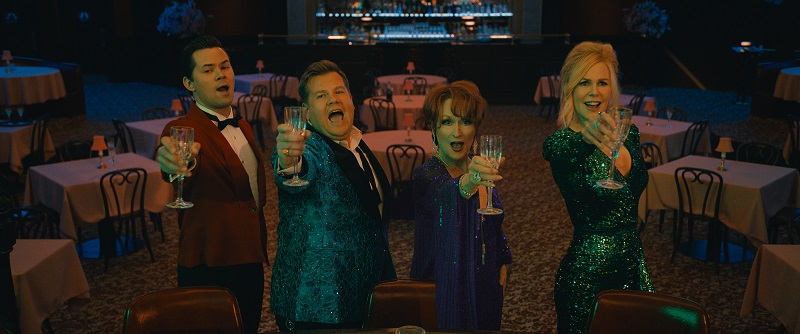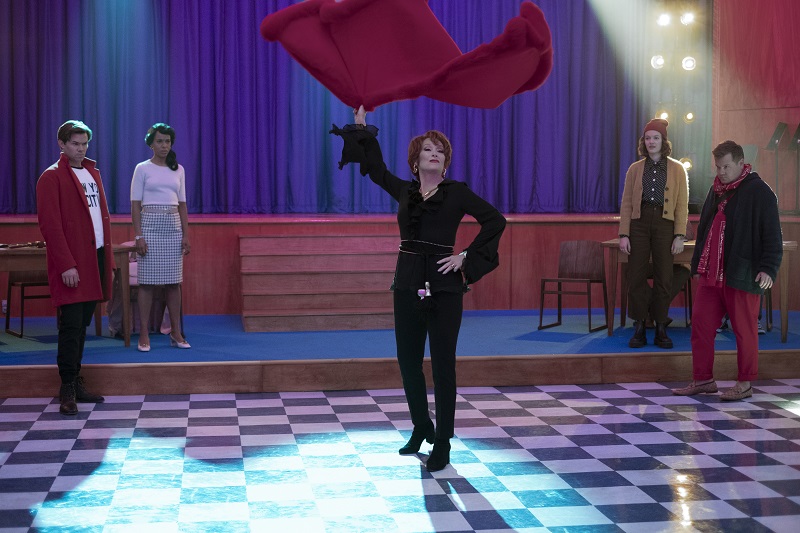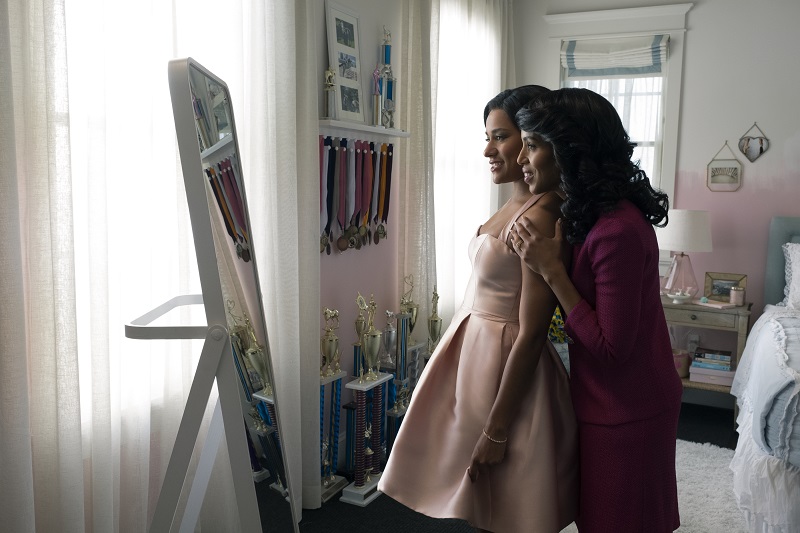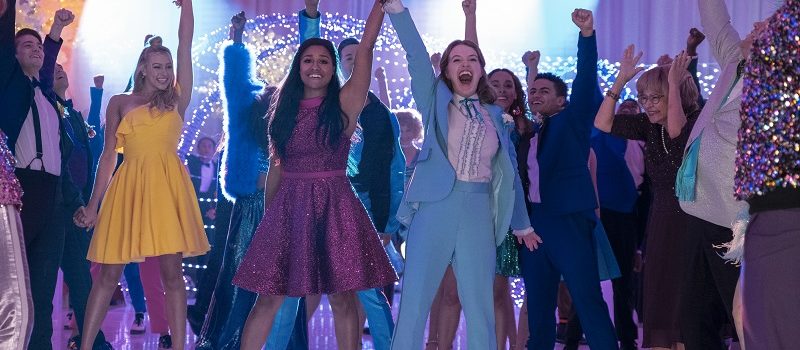The Prom may seem like it could be a musical taken from the stages of Broadway and brought to Netflix for those who may have missed their own rite of passage. That couldn’t be further from the truth when it comes to what the Meryl Streep, James Corden, and Nicole Kidman starring movie musical undertakes and most importantly, represents.

The history of the production does commence on the Great White Way. The Prom premiered on November 15, 2018, and is a song and dance tribute to that cultural institution.
The narrative in The Prom is about the famed springtime dance as much as winning a state title is at the heart of Remember the Titans.
The Prom is a bonafide Broadway production that uber-producer/director Ryan Murphy (Glee, Hollywood and Eat, Pray, Love) has gloriously captured with his lens. The production is firmly in his storytelling wheelhouse. Murphy has inequitably portrayed diversity in ways that are not tokenism, but a true reflection of a segment of the population that has been historically forced to live in the shadows at the least and at the most be actively discriminated against.
Emma Nolan (Jo Ellen Pellman) simply wants to go to her Indiana small town’s end of the year high school dance (aka The Prom) with her girlfriend. When word of that permeates the upper echelons of the town’s body politic, the head of the PTA realizes she’s been pushed into a legal corner with only one thing left to do—PTA Head Mrs. Greene (Kerry Washington, Scandal) cancels the prom.
Half a country away, in that elitist enclave that is New York City, the evening after an Eleanor Roosevelt musical’s crash and burn premiere, its stars Dee Dee Allen (Meryl Streep) and Barry Glickman (James Corden)—along with lifelong chorus girl Angie Dickinson (Nicole Kidman) and Julliard trained (he tells anyone who will hear) Trent Oliver (The Book of Mormon’s Andrew Rannells) catch wind of Emma’s situation. This Broadway Fab Four decide to travel to the Midwest state, set up shop, and get this girl a prom!
There is a needle here to be thread and at first, it seems a bit heavy-handed. Perhaps it is fitting that the story takes place in Indiana, a place that gave us Governor Mike Pence, current occupier of the Vice President mansion whose anti-gay stance is notorious. The thing is in The Prom the Broadway stars arrive and basically inform the entire town that they are intolerant of anything different. Now, Washington’s Mrs. Greene may support that impression. But sensing it and calling it out (by entertainment types no less) so blatantly are different animals.
There is no room in 2020 for intolerance. Yes, sometimes Murphy’s material can come across as heavy-handed. In this case, at this moment, it is, but it quickly morphs into a mission to understand where these locals are coming from. When it is revealed that the source is fear, well then… that a movie musical can deal with head-on!
Emma has an administrator in her corner in the form of Principal Tom Hawkins (Keegan-Michael Key) who sees what is happening as a human rights issue. He doesn’t ask for the Broadway stars’ help, and in many ways their desire for good publicity to counteract the terrible Eleanor reviews, makes things worse. But the wizards behind The Prom have done something magical here, and that is have Hawkins be the hugest Allen and musical theater fan. He’s straight (which at first confuses Allen), but that fact allows him to profess firmly that equal rights are equal rights.
The ensemble gathered for this epic is sensational. First, the Broadway babies—Streep, Corden, Kidman, and Rannells have an utter blast. From the second we meet them what is clear that these titanic talents can do the song and dance numbers that have us cheering from the rafters, sure, but they share a passion for the art of expression, in their case on the stage.
What is so beautiful about The Prom is that that adoration can be applied to oneself. Check that… it must be applied to yourself.

Upon their arrival in Indiana, that line they’re straddling becomes ever thinner as they check into a hotel and ask for spa and suites. It’s played for humor, but Murphy and company try gallantly to showcase that arty-types don’t think of states like Indiana as fly-over wastes of time.
Keagan may play the “enlightened” one, but like so many issues of our time, discrimination comes down to a lack of exposure and education. The comedic actor plays his principal firmly as the “pal” to his students, who also can possess the mettle to lecture these celebrities in sticking their nose where it is not welcomed.
Murphy teaches many who have come before him how to capture a Broadway production for the medium of film. The film pulsates with excitement and an explosion of color whose vibrancy fits the production’s themes, songs, and palpable panache.
The choreography by Casey Nicholaw is otherworldly. It literally feels as if it is exploding off of my television. There are jazz hands moments. That is merely where Nicholaw begins, but where he finishes is in another stratosphere. There are some epic moments, such as a number in a mall as well as the production commencing sequence, that could not be more award-worthy.
What’s fascinating is the cinematography by Matthew Libatique accompanies the choreography in a manner that here is utterly successful. Yes, Libatique has a film to shoot, but the comfort level with working with the choreographer bleeds into how the cinematographer shoots the entire endeavor.

The musical numbers and songs are catchy, heartfelt, sometimes hilarious but always righteous. The original score by David Klotz and Matthew Sklar elevates the material as only a solid score can do.
Numbers that stick out are Streep getting a chance to sing to the heavens and belt out a few numbers that could not be more electric, including It’s Not About Me and The Lady’s Improving.
There are also so-called “message songs” that still do the Broadway song and dance revelry, including The Acceptance Song and Love Thy Neighbor, while Kidman gets a dazzler on her own with Pellman that feels right out of a Bob Fosse production, appropriately called Zazz. Murphy is a student of the Broadway/Hollywood legend as the Fosse factor is immense, but there is something about Zazz that punches the pizzazz right out of the building!
The Prom seeks to educate while it entertains and if one can get past the Indiana is hell for anyone who seeks to express themselves differently, it succeeds. Murphy dazzlingly brings Broadway to the masses and in the process introduces a legion of musical theater fans to their new obsession.
Grade: B+

